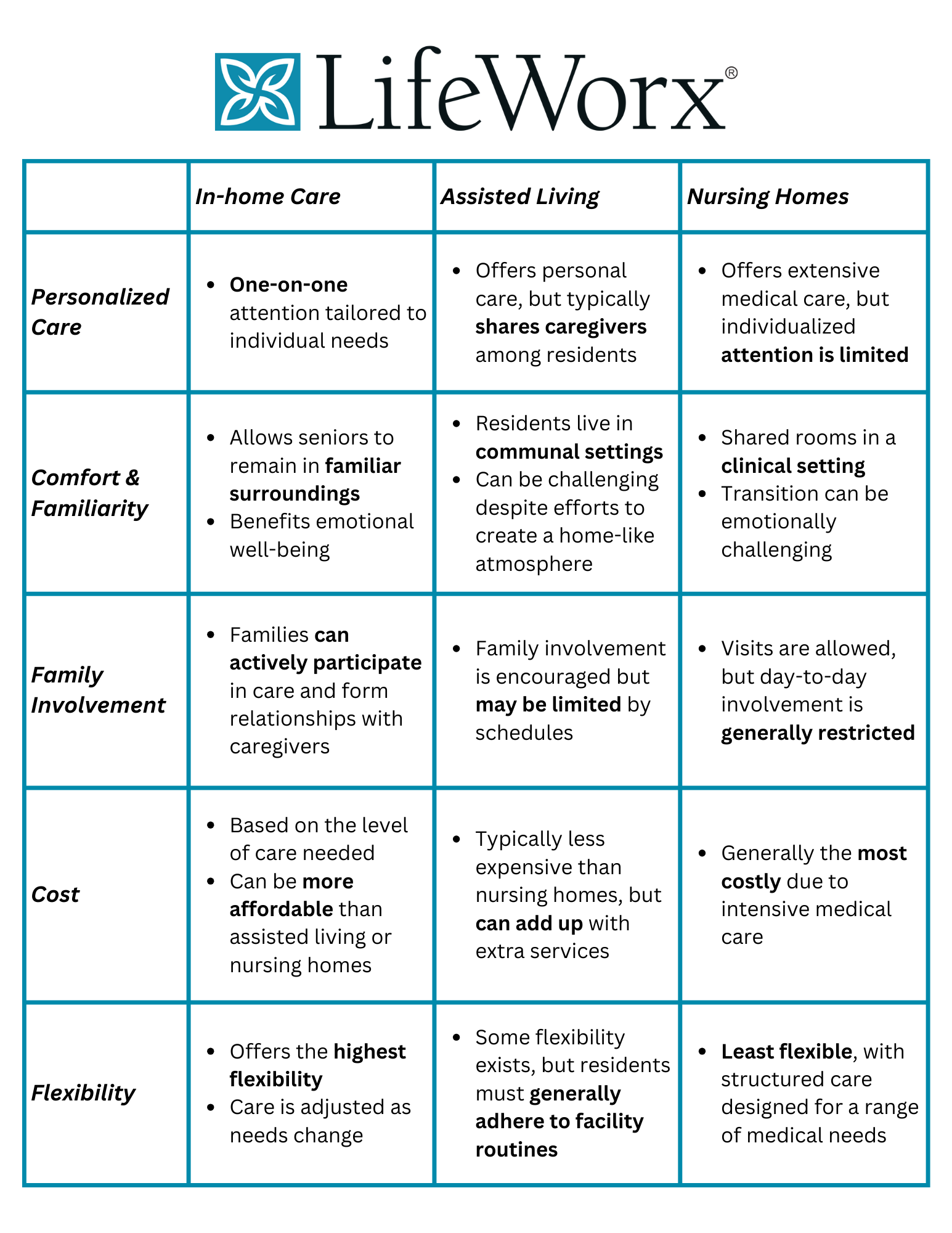
Understanding In-Home Care
Key Takeaways
- In-home care provides help with daily activities while allowing seniors to remain at home.
- Support can range from a few hours a week to full-time care.
- Services include personal care, meal prep, medication reminders, and companionship.
- It offers flexibility and can adapt as needs change over time.
- LifeWorx creates customized care plans to match each client’s lifestyle and goals.
As our loved ones age, making sure they receive the best care possible becomes a top priority. For many families, in-home care offers the best solution by providing personalized and professional assistance in the comfort of one’s home. At LifeWorx, our services include 24-hour care, companion care, in-home health aides, and private duty nursing.
What is in-home care?
In-home care includes a range of services delivered in the comfort of a person’s home to improve their overall health, happiness, and quality of life. Unlike the care provided in institutional settings, in-home care allows individuals to stay in a familiar environment while getting the support they need. This type of care addresses the unique needs of each person, whether they require help with daily activities, medical care, or simply need companionship.
Types of in-home care services
This service provides continuous care throughout the day and night. Caregivers work in shifts to ensure that someone is always available to assist with activities of daily living, such as bathing, dressing, and getting around. Individuals who require constant supervision due to chronic conditions, dementia, or frailty often benefit the most from 24-hour care.
For those who prefer a more personal and consistent presence, live-in care offers a compassionate alternative. In live-in care, a dedicated caregiver resides in the home and is available for both physical and emotional support at all hours. Unlike the shift structure of 24-hour care, live-in care provides the comfort of having one caregiver present, helping to develop a more trusting relationship.
Companion care focuses on providing emotional support and company, along with help with light household tasks, errands, and transportation. Seniors who are isolated, lonely, or in need of social interaction, as well as those who require assistance with non-medical tasks may benefit from companion care.
Individuals who need help with daily personal care but do not require advanced medical care may benefit from this support. Health aides help with personal care tasks, including hygiene, grooming, and basic health monitoring. They are trained to provide non-medical support, such as helping with meals, mobility, and simple exercises.
Individuals with chronic medical conditions, post-surgical patients, or those requiring specialized care at home may need private duty nursing services. Services may include wound care, medication management, and more complex medical procedures provided by licensed nurses in the home.
The value of in-home care
In-home care offers a wide range of benefits, making it a popular choice for many families seeking senior care. Let’s compare the value of in-home care to other common senior care options:

Click here to save the chart.
Frequently Asked Questions
How do I know if my loved one needs care?
Look for signs such as difficulty with activities of daily living (bathing, dressing, etc.), memory issues, frequent falls, social isolation, or medical conditions that require regular monitoring. If your loved one is experiencing frequent falls or showing a decline in their ability to manage daily tasks, it may be time to consider additional support.
How are caregivers selected and trained?
Every LifeWorx caregiver is meticulously evaluated through in-person interviews, character assessments, and references families they have worked with long term. Our candidate relations managers bring in highly qualified, trustworthy, and compassionate career caregivers who are ready to provide exceptional care.
What can caregivers help with?
Caregivers help in many ways including, but not limited to assisting with personal care, medication reminders, housekeeping, meal preparation, and running errands.
Can in-home care be short-term?
Yes, in-home care can be arranged for short-term needs, such as postoperative care. It is also beneficial for long-term care, particularly for those with ongoing health needs requiring constant support.
How can I convince my loved one to accept care?
Focus on how in-home care will improve their quality of life, independence, and safety. Having this conversation is never easy, but we’re happy to help guide you through it. You can also learn about other strategies in our article.
What if my loved one needs 24/7 care?
LifeWorx can provide 24-hour care through live-in care or 12-hour shifts. We aim for a consistent caregiver presence, minimizing the number of caregivers involved to provide stability and continuity of care.
Is in-home care covered by insurance?
Speak with our LTC expert about your policy today. If you are unfamiliar with long-term care insurance, read our series here.
In-home care is a valuable resource that allows seniors to receive personalized care in their own homes. Whether it’s continuous care, companionship, help with daily activities, or nursing services, in-home care provides an adaptable and affordable solution. Contact us today to explore the best options for your family.

















